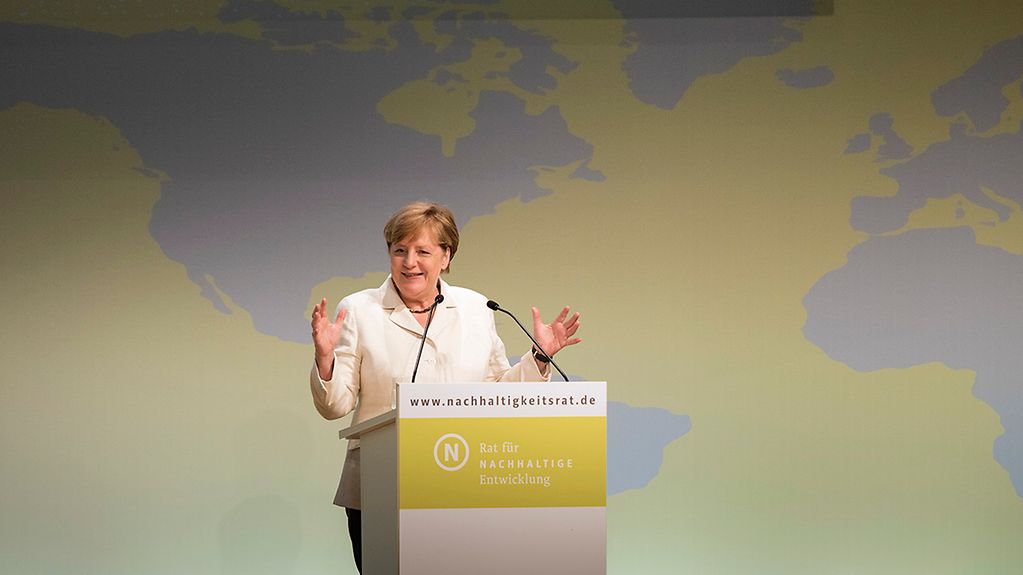Sustainable strategies and action called for
Speaking at the annual meeting of the German Council for Sustainable Development, the Chancellor has called on everybody to act in order to achieve sustainability. The word ‘sustainability’ is on everybody’s lips, said, but there are less than 5,000 days to go until 2030, the cut-off point of the United Nations 2030 Agenda for Sustainable Development.
4 min reading time

"German expertise and credibility in the field of sustainability attract great interest worldwide," says Angela Merkel
Photo: Bundesregierung/Steins
At the annual meeting of the German Council for Sustainable Development, Chancellor Angela Merkel expressed her delight that sustainability has become an established part of public discussion and debate.
Nevertheless, the "pretty ambitious" 2030 Agenda requires that all of us are ready and able to make changes. "How we manufacture and work, what we transport and how we transport it, how we ourselves get from A to B, how we live and consume – the principle of sustainability demands that we rethink all of these, and that we change the way we act," said Chancellor Angela Merkel. The major challenges facing the world do not stop at national borders, she pointed up. It is up to every one of us to do our bit. "If we leave it up to others to act, we will have to accept that things might change in a way that is not compatible with our values or our interests," warned the Chancellor.
Proactive rather than reactive
The highly complex tasks ahead will require equally highly differentiated solutions, said Angela Merkel. She declared that she also sees this as an opportunity to achieve economic, environmental and social progress.
The National Sustainable Development Strategy adopted by the German government in January enjoys an excellent international reputation, with its objectives-oriented approach, said the Chancellor. German expertise and credibility in the field of sustainability attract great interest worldwide. The positive response to the strategy also confirms that we are on the right road, she said, and called on all stakeholders to take this "as an incentive to progress along this road now, step by step".
The Chancellor reminded her audience that at this time of rapid change, it is not inconceivable that some interim goals set today could suddenly become obsolete and that modifications might well be necessary. "By 2018 we will be examining what changes must be made to indicators and objectives, if any." The indicator report published once every two years by the Federal Statistical Office (Destatis) provides relevant information. An international evaluation is also due to take place within the next few years. The findings will then be incorporated in the reworking of the strategy, announced Chancellor Angela Merkel.
Sustainability on the G20 agenda
Germany’s G20 Presidency too will be addressing urgent aspects of sustainability, including climate change mitigation and energy, global supply chains and trade, health and food security, protecting the environment and the world’s oceans, education, and empowering girls and women. The Chancellor believes that the leading industrialised nations and emerging economies should act as trailblazers here, although different countries can take different paths to achieve the common goal.
She singled out the particularly desperate situation in Africa, and pointed out how urgently action is needed. "If you see how many people are suffering acute hunger today – in Somalia, South Sudan, the Lake Chad Region – and how indifferent some of the international community is in its response, you will see what I mean when I say that every day counts."
The Chancellor stressed how important it is to pull together, in this as in other contexts. To prevent political action in one field obstructing action in another field, the German government has acted on the proposal of the Parliamentary Advisory Council and the Council for Sustainable Development, and appointed coordinators for sustainability within every ministry. This step alone is not enough, but it will facilitate technical dialogue between ministries.
Beacon project for sustainable urban development
An inter-ministerial working group on sustainable urban development is one body involved in strengthening cooperation at regional level. With good reason, declared Angela Merkel, this body and its activities was recently selected as a beacon project for this year. The Chancellor said, "In view of the continued inflow to urban conurbations this is an issue that is becoming increasingly relevant."
She also pointed to the importance of many other activities and forums that have set themselves the goal of fostering sustainability, and gave a few examples: the Regional Hubs for Sustainability Strategies (also known by the German acronym RENN), the Science Platform Sustainability 2030, German industry and its Sustainability Award, the Sustainability Code developed by the German Council for Sustainable Development, and even the deliberations of the OECD on sustainability.
It is important to address a complex issue appropriately, said Angela Merkel and called on the German Council for Sustainable Development to have the courage to be "difficult". The German government, she said, is willing to listen.